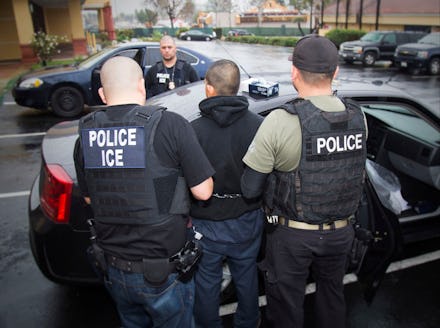What to do if ICE ever shows up at your door

On the night of Wednesday, July 10, The New York Times published a report detailing that Immigration and Customs Enforcement (ICE) would begin raids targeting families on July 14 across the country. According to immigration officials, the raids are intended to focus on immigrants with court-ordered deportation notices. However, officials also said that any immigrants without documentation who happen to be on the scene when the raids occur are subject to arrest.
The raids were initially scheduled to occur weeks ago, but after officials within ICE and the Department of Homeland Security expressed hesitation in carrying out the operation and details of the raids were leaked, the plan was delayed. The complete details of the upcoming raids have not yet been released; most officials spoke to the Times on conditions of anonymity.
What is known is that the raids will target families who recently crossed the U.S. border, that they will occur over a period of several days, and that they will occur in 10 major U.S. cities. A list of those cities has not been revealed, but when the raids were discussed in June, Atlanta, Baltimore, Chicago, Denver, Houston, Los Angeles, Miami, New Orleans, New York and San Francisco were listed as ICE targets.
Past ICE raids have been condemned by law enforcement, because the presence of immigration enforcement can deteriorate the trust between police and undocumented communities. And while ICE spokesman Matthew Bourke has said that the purpose of the upcoming raids is to prioritize the removal of "unlawfully present aliens who pose a threat to national security, public safety and border security," the result will undoubtedly be entirely different. Already, the threat has stoked immense fear in immigrant communities across the country, not only for people who are undocumented but for their friends and families.
Yet acting US Citizenship and Immigration Services director Ken Cuccinelli told CNN on July 10 that the raids were "absolutely going to happen." So what now? Whether you're documented or not, if you're living in one of the cities likely to be targeted by ICE, it is important to know what to do if agents show up at your door. Here's what the ACLU and immigration advocacy organization United We Dream advise.
Don't let ICE officers into your home, unless they have a warrant signed by a judge
If ICE comes to your home, you do not have to open the door. You can first demand that the agents prove that they have a judicial warrant signed by a judge, and they can slide this warrant under the door or present it through the peep-hole. Take note, however, that ICE agents could provide a warrant that is not signed by a federal judge, but that this does not give them the right to enter your home.
Don't answer their questions
If your encounter with ICE lasts beyond a knock on your door, do not answer their questions. Instead, plead the fifth amendment and remain silent. Tell the agents that you do not consent for them to enter your home, and that you do not want to talk to them without a lawyer present.
If you are arrested by ICE, this remains true. Do not answer questions unless you have legal representation. On that note:
Contact a lawyer
If you are stopped or detained by ICE, reach out to legal counsel. If you are detained, the government is not required to provide you with a lawyer, according to the ACLU, but you can ask to see a list of free and low cost alternatives for legal representation.
Don't sign anything
ICE agents have been known to offer documents to people they arrest that can be incriminating or further complicate cases. Do not sign anything unless you have spoken with your attorney.
Film the encounter
Whether you are the person ICE has sought out, or you're just standing by, you can and should record the incident (as long as you are not on federal property). If someone is detained following their encounter with ICE, audio and/or video of the incident could be used to help that person in court.
No matter what, you shouldn't be passive. It is within your rights to to be present, observe, bear witness, pray, photograph, and videotape. The right to film law enforcement in specific situations, however, varies from state to state, so make sure you are know the laws for your area.
If you live near undocumented people, share this information
United We Dream has provided informational graphics about ICE that can be shared in 11 languages — English, Chinese, Spanish, Portuguese, Arabic, Farsi, Hindi, Korean, Marathi, Vietnamese, and Tagalog. You can repost these graphics on your social media, in community groups, or anywhere else people can see them.
Additionally, United We Dream has a complete Know Your Power campaign, with information and videos that provide guides and resources on the rights that undocumented people have. And if you're a U.S. citizen, the organization has a list of ways you can assist people who are targeted by ICE here. The ACLU has its own resources as well, with a full guide of what to do under multiple scenarios involving interacting with law enforcement as an immigrant, no matter what your status is.
It is crucial to know that these raids are happening, and what your rights are for when they do. These operations are designed to create fear and intimidation in immigrant communities, and allow Trump to fulfill one of his many racist campaign promises regarding immigration.